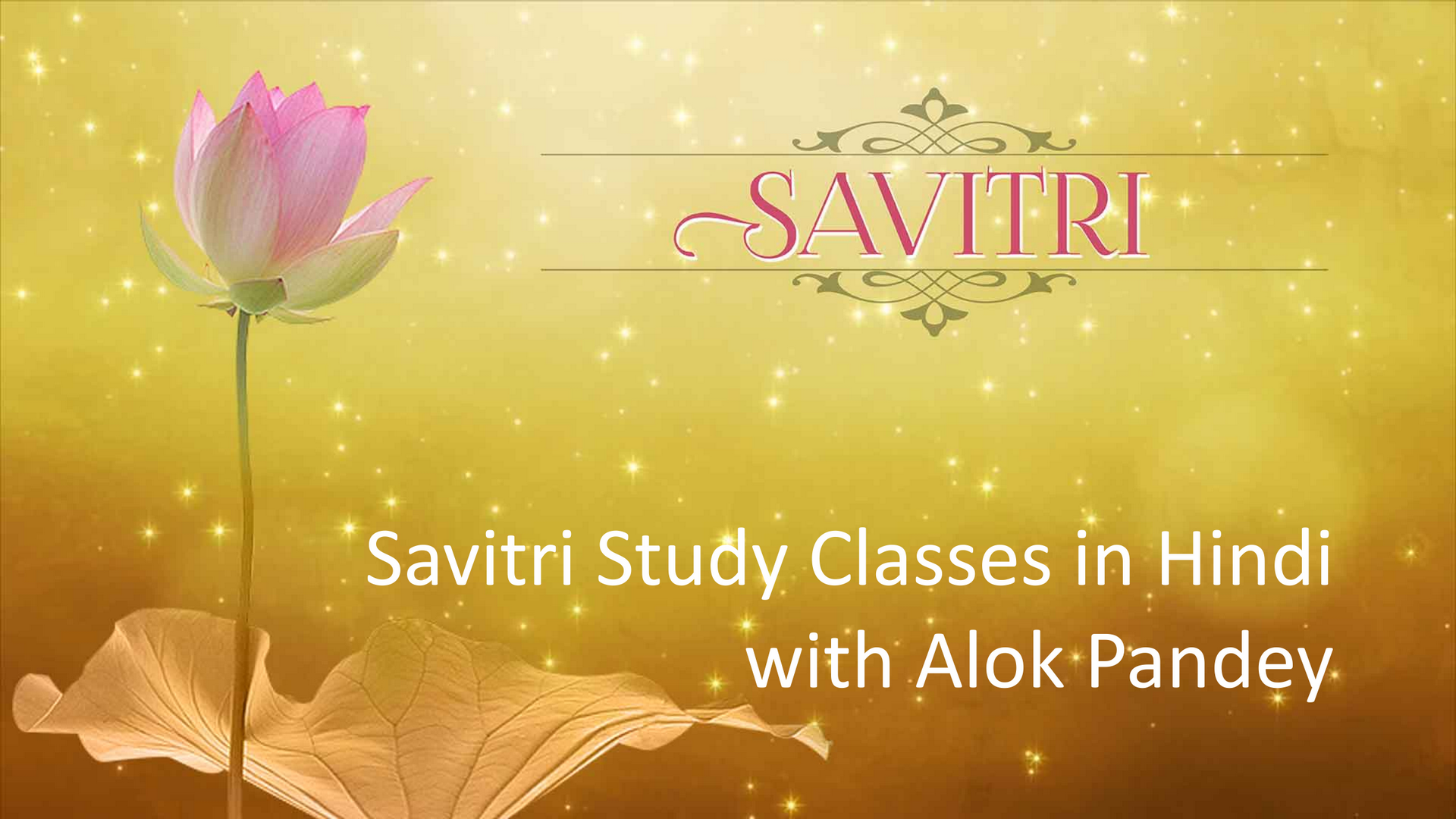Savitri Class in Hindi with Alok Pandey
Book Ten: The Book of the Double Twilight, Canto One: The Dream Twilight of the Ideal, Canto Two: The Gospel of Death and Vanity of the Ideal
The heavens of religions are partly human made. Drawing from the energies of the gods, the human mind constructs for itself happier states. His heart’s longings and hopes, his higher idealisms and dreams create for his soul a mental heaven in which it can dwell for a while after death.
The joys here snatched were half-forbidden things,
Timorous soul-bridals delicately veiled
As when a goddess’ bosom dimly moves
To first desire and her white soul transfigured,
A glimmering Eden crossed by faery gleams,
Trembles to expectation’s fiery wand,
But nothing is familiar yet with bliss.All things in this fair realm were heavenly strange
In a fleeting gladness of untired delight,
In an insistency of magic change.Past vanishing hedges, hurrying hints of fields,
Mid swift escaping lanes that fled her feet
Journeying she wished no end: as one through clouds
Travels upon a mountain ridge and hears
Arising to him out of hidden depths
Sound of invisible streams, she walked besieged
By the illusion of a mystic space,
A charm of bodiless touches felt and heard
A sweetness as of voices high and dim
Calling like travellers upon seeking winds
Melodiously with an alluring cry.As if a music old yet ever new,
Moving suggestions on her heart-strings dwelt,
Thoughts that no habitation found, yet clung
With passionate repetition to her mind,
Desires that hurt not, happy only to live
Always the same and always unfulfilled
Sang in the breast like a celestial lyre.Thus all could last yet nothing ever be.
In this beauty as of mind made visible,
Dressed in its rays of wonder Satyavan
Before her seemed the centre of its charm,
Head of her loveliness of longing dreams
And captain of the fancies of her soul.Even the dreadful majesty of Death’s face
And its sombre sadness could not darken nor slay
The intangible lustre of those fleeting skies.The sombre Shadow sullen, implacable
Made beauty and laughter more imperative;
Enhanced by his grey, joy grew more bright and dear;
His dark contrast edging ideal sight
Deepened unuttered meanings to the heart;
Pain grew a trembling undertone of bliss
And transience immortality’s floating hem,
A moment’s robe in which she looked more fair,
Its antithesis sharpening her divinity.A comrade of the Ray and Mist and Flame,
By a moon-bright face a brilliant moment drawn,
Almost she seemed a thought mid floating thoughts,
Seen hardly by a visionary mind
Amid the white inward musings of the soul.Half-vanquished by the dream-happiness around,
Awhile she moved on an enchantment’s soil,
But still remained possessor of her soul.Above, her spirit in its mighty trance
Saw all, but lived for its transcendent task,
Immutable like a fixed eternal star.END OF CANTO ONE
Book Ten: Canto Two.
The Gospel of Death and Vanity of the Ideal
Then pealed the calm inexorable voice:
Abolishing hope, cancelling life’s golden truths,
Fatal its accents smote the trembling air.
That lovely world swam thin and frail, most like
Some pearly evanescent farewell gleam
On the faint verge of dusk in moonless eves.“Prisoner of Nature, many-visioned spirit,
Thought’s creature in the ideal’s realm enjoying
Thy unsubstantial immortality
The subtle marvellous mind of man has feigned,
This is the world from which thy yearnings came.When it would build eternity from the dust,
Man’s thought paints images illusion rounds;
Prophesying glories it shall never see,
It labours delicately among its dreams.
Behold this fleeing of light-tasselled shapes,
Aerial raiment of unbodied gods;
A rapture of things that never can be born,
Hope chants to hope a bright immortal choir;
Cloud satisfies cloud, phantom to longing phantom
Leans sweetly, sweetly is clasped or sweetly chased.This is the stuff from which the ideal is formed:
Its builder is thought, its base the heart’s desire,
But nothing real answers to their call.
The ideal dwells not in heaven, nor on the earth,
A bright delirium of man’s ardour of hope
Drunk with the wine of its own fantasy.It is a brilliant shadow’s dreamy trail.
Thy vision’s error builds the azure skies,
Thy vision’s error drew the rainbow’s arch;
Thy mortal longing made for thee a soul.[Savitri: 604 – 608]
(line breaks added to emphasize separate movements)




About Savitri | B1C1-09 Advent of the Divine Mother (p.4)